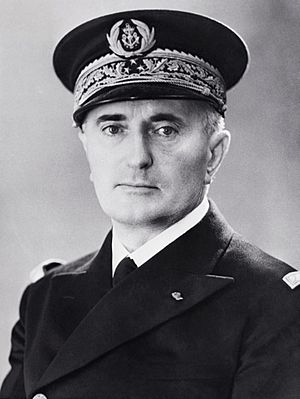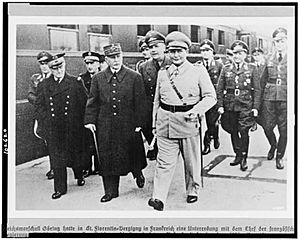François Darlan facts for kids
Quick facts for kids
François Darlan
|
|
|---|---|

Darlan circa 1940
|
|
| Prime Minister of France (as Vice-President of the Council) |
|
| In office 9 February 1941 – 18 April 1942 |
|
| Preceded by | Pierre Étienne Flandin |
| Succeeded by | Pierre Laval |
| High Commissioner of France in Africa (French North Africa and French West Africa) | |
| In office 14 November 1942 – 24 December 1942 |
|
| Preceded by | Position created |
| Succeeded by | Henri Giraud (as French Civil and Military Commander-in-chief) |
| Personal details | |
| Born |
Jean Louis Xavier François Darlan
7 August 1881 Nérac, Lot-et-Garonne, France |
| Died | 24 December 1942 (aged 61) Algiers, Alger, French Algeria |
| Military service | |
| Allegiance | |
| Branch/service | French Navy |
| Years of service | 1902–1942 |
| Rank | Admiral of the Fleet |
| Commands | Chief of Staff of the French Navy Edgar Quinet Jeanne d'Arc |
| Battles/wars | World War I World War II |
| Awards | Grand Cross of the Legion of Honour Médaille militaire Croix de Guerre |
Jean Louis Xavier François Darlan (born August 7, 1881 – died December 24, 1942) was a French admiral and political leader. He was born in Nérac, France. Darlan joined the French Navy in 1902 and quickly moved up in rank after serving in World War I.
By 1937, he was an admiral and the Chief of the Naval Staff. In 1939, he became an Admiral of the Fleet, a special rank created just for him. This made him the Commander-in-Chief of the French Navy at the start of World War II.
After France surrendered to Germany in June 1940, Darlan joined Philippe Pétain's Vichy government. He became the Minister of Marine. In February 1941, he took on many important roles, including Vice-President of the Council. This made him the effective leader of the Vichy government.
In April 1942, Darlan gave up most of his government jobs to Pierre Laval because Germany wanted him to. However, he remained in charge of the French Armed Forces.
In November 1942, Darlan was in Algiers when the Allies invaded French North Africa. The Allied commander, Dwight D. Eisenhower, made a deal with Darlan. Darlan was recognized as the High Commissioner of France for North and West Africa. In return, Darlan ordered all French forces in North Africa to stop fighting and help the Allies.
Less than two months later, on December 24, 1942, Darlan was killed by a young man named Fernand Bonnier de La Chapelle.
Contents
François Darlan was born in Nérac, France. His family had a long history with the French Navy. His great-grandfather died in the Battle of Trafalgar. His father, Jean-Baptiste Darlan, was a lawyer and politician. He even served as the Minister of Justice.
Darlan graduated from the École Navale (Naval Academy) in 1902. During World War I, he commanded an artillery unit. After the war, he commanded training ships like the Jeanne d'Arc. He was promoted to captain in 1926.
Darlan rose quickly through the ranks. He became a rear admiral in 1929 and a vice admiral in 1932. In 1934, he took command of the Atlantic Squadron. He was promoted to admiral in 1937. As head of the Navy, he worked hard to get more ships built. This was to prepare for the growing naval power of Germany and Italy.
In 1939, a new rank was created for him: Amiral de la flotte (Admiral of the Fleet). This rank was meant to put him on equal footing with the head of the British Royal Navy. When World War II began in September 1939, Darlan became the Commander-in-Chief of the French Navy.
Darlan and the Vichy Government
France's Surrender and the Armistice
Darlan was very proud of the French Navy. When Axis forces defeated France in May–June 1940, Darlan first said he would lead the fleet to fight with the British. He promised British Prime Minister Winston Churchill that no French ship would ever fall into German hands.
However, on June 15, 1940, Darlan changed his mind. He believed Britain was finished and that France needed an armistice. He agreed to an armistice as long as the French fleet stayed out of German control.
On June 16, Paul Reynaud, the French Prime Minister, resigned. Philippe Pétain formed a new government to seek an armistice with Germany. Darlan became the Minister of Marine in Pétain's government. On June 18, Darlan again promised the British that the French fleet would not fall into German hands.
Pétain's government signed an armistice on June 22, 1940. It kept control of parts of France, known as "Vichy France". The capital moved to Vichy.
The armistice terms said that French Navy ships would be disarmed under German supervision. Churchill was worried that these ships could still be taken by Germany. Darlan ordered all French ships in Atlantic ports to sail to French overseas territories, away from German control.
Despite Darlan's promises, Churchill remained concerned. He believed Darlan might not be able to keep his word. Darlan refused British requests to put the entire French fleet under British control. This led to Operation Catapult on July 3, 1940. The Royal Navy attacked French ships at Mers-el-Kébir to prevent them from falling into German hands.
After this attack, French forces loyal to Vichy often resisted British actions. They sometimes even worked with German forces. However, as Darlan had promised, no major French warships were taken by Germany. Only a few smaller vessels were captured.
Darlan believed the Axis powers would win the war. He thought it was best for France to work with Germany. He did not trust the British. After the attack on Mers-el-Kébir, he even thought about fighting a naval war against Britain.
Darlan's Role in Vichy (1941–1942)
By 1941, Darlan had become Pétain's closest helper. In February 1941, Darlan replaced Pierre-Étienne Flandin as "Vice President of the Council" (like a prime minister). He also became Minister of Foreign Affairs, Minister of the Interior, and Minister of National Defence. This made him the effective head of the Vichy government.
Darlan offered Hitler military help against Britain. However, Hitler did not trust France and wanted it to stay neutral.
Darlan tried to negotiate the Paris Protocols with Germany in May 1941. These talks aimed for Germany to make some concessions, and France to allow German bases in its colonies. This part was opposed by General Maxime Weygand. The Protocols were never fully agreed upon.
However, the Germans started to suspect Darlan. He refused to provide French workers for Germany. He also protected Jewish war veterans and was slow to enforce anti-Jewish laws. After the British took French Syria and Lebanon in 1941, and Germany's invasion of the USSR slowed down, Darlan began to move away from full cooperation with Germany.
Darlan had a lot of power because he reported only to Pétain. He used the loyalty of French army and naval officers in the colonies to prevent them from joining Free France.
In April 1942, Germany insisted that Darlan resign from his main government roles. He was replaced by Laval, whom the Germans trusted more. Darlan still kept some lesser positions, including commander-in-chief of the French armed forces.
The "Darlan Deal" in North Africa
On November 7, 1942, Darlan was in Algiers visiting his sick son. The next day, November 8, the Western Allies launched Operation Torch, invading French North Africa. During the night, a group in Algeria that supported the Allies took control of Algiers. They also captured Darlan.
The Allies expected little resistance from French forces. They thought the French would accept General Henri Giraud as their new leader. But the French forces continued to fight, and Giraud had no official power. To quickly end the fighting, the Allies made a deal with Darlan. As commander-in-chief, Darlan could give the necessary orders.
Dwight D. Eisenhower, the Allied commander, recognized Darlan as the commander of all French forces in the area. Darlan also named himself High Commissioner of France for North and West Africa on November 14. In return, on November 10, Darlan ordered all French forces to join the Allies. This order was followed in French North Africa and French West Africa.
The "Darlan deal" was very controversial. Many people were upset because Darlan had worked with Germany. General Charles de Gaulle and his Free France organization were angry. Some American and British officials also objected.
President Franklin Delano Roosevelt defended the deal. He said it was a "temporary solution, justified only by the stress of battle." Churchill also supported it, saying it meant French guns would be pointed at Axis soldiers, not Allies. Some historians believe Darlan had been secretly talking with American diplomats for months about switching sides.
The deal also angered Berlin and the Vichy government. Pétain removed Darlan from his offices and ordered resistance in North Africa, but his orders were ignored. German troops then occupied the remaining parts of France. However, the Germans paused outside Toulon, where most of the remaining French ships were. On November 27, when the Germans tried to seize the ships, the French scuttled (sank) their own fleet. This mostly fulfilled Darlan's promise from 1940.
Assassination
On the afternoon of December 24, 1942, Fernand Bonnier de La Chapelle shot Darlan at his headquarters. Darlan died a few hours later. Bonnier de La Chapelle was 20 years old. He was part of a group that wanted to bring back the French monarchy.
De La Chapelle was arrested right away. He was tried and found guilty the next day. He was executed by firing squad on December 26.
Legacy
Darlan was not popular with the Allies. He was seen as a bit arrogant. For example, he once asked Eisenhower for 200 British guards for a ceremony. It was said that the British were not sad about his death. Harold Macmillan, a British official, described Darlan's service by saying, "Once bought, he stayed bought."
Decorations
 Knight of the Order of Agricultural Merit: 1906
Knight of the Order of Agricultural Merit: 1906 Officer of the Order of Maritime Merit: 1931
Officer of the Order of Maritime Merit: 1931 Grand Cross of the Legion of Honour: 1937
Grand Cross of the Legion of Honour: 1937
See also
 In Spanish: François Darlan para niños
In Spanish: François Darlan para niños
 | Jessica Watkins |
 | Robert Henry Lawrence Jr. |
 | Mae Jemison |
 | Sian Proctor |
 | Guion Bluford |


